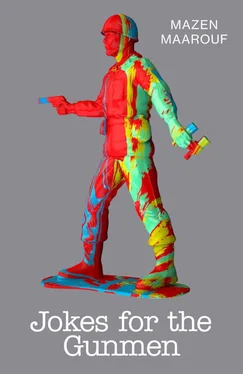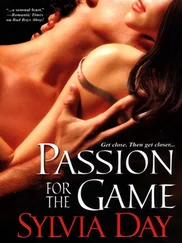There was nothing I could do. I sat next to him on the edge of the bed and picked up the music box with the gramophone handle, which was the last thing my father’s hand had touched before his arm was cut off. I started to turn it. I wanted him to hear the music in the box before he passed away. I saw his lips move to make a feeble smile.
But he didn’t revive. He just smiled. As he did so, I had the impression that his arms were growing slowly from their stumps, like mushrooms, their stalks pushing up from the ground after a heavy weight, such as a hat full of padlocks, has been removed. That encouraged me and I started turning the handle faster and faster. My heart was pounding. I wanted his arms to grow, to be fully grown, as if the vacuum bomb had never fallen and my mother had not spent her whole life putting nappies on him, and he was no longer lying beside this little music box, waiting for something to happen, something unique.
IT ALL HAPPENED ON THE FIFTH DAY AFTER WE took shelter in the cinema. The food had almost run out and we were reduced to eating yellow triangles of processed cheese. At one o’clock in the afternoon Mother would take a wedge of cheese out of our teddy bear’s tummy and divide it in half. I would eat one half and my sister would eat the other half, our heads hidden under the velvet cinema seats so that the other children, who were just as hungry as us, wouldn’t see us. We didn’t tell anyone there were seven wedges of cheese in the teddy bear’s tummy.
At eight in the evening Mother would take another wedge of cheese out of the bear’s tummy, and my sister and I would eat it in the same way and then go to sleep. Dozens of families had taken shelter in the cinema because it was three floors below ground level.
On the first day the families spread themselves out over all the seats but the shelling grew more intense every day and every now and then people would move a little further down, away from the higher seats towards the lower ones. When one of the occupying army’s tanks shelled the projection room at the top end of the auditorium, most of the families gathered on the stage and hid behind the curtain. The dividing line between us and the outside world was then the small wall that separated the projection room from the auditorium. The children could see daylight through the rectangular opening through which the film was usually projected.
Sometimes we would see Crazy Kimo go past outside. Kimo never took refuge anywhere throughout the war. He wasn’t welcome in any of the shelters. It was said that he’d gone mad because he still had a piece of shrapnel in his body – no one knew exactly where. From the stage in the cinema you could see the empty street. If you stood at the edge of the curtain, a very small piece of the big wheel at the fairground was visible. The bottom corner of the curtain was the favourite place for children and they hung out there all day long.
On the fifth day a shell fell on the cinema, among the seats. I don’t remember all the details. The blast threw me off the stage onto one of the seats in the auditorium. When I opened my eyes, I couldn’t move and the seat was back to front, facing the road instead of the screen. The other strange thing was that the wall between the projection room and the auditorium had not been knocked down. When I tried to see where the shell that landed in the cinema had come from, I couldn’t work it out. There wasn’t a hole anywhere. My sister’s teddy bear was now in my arms, but my sister was nowhere to be seen. Nor was my mother, nor any of the other children or their families. The teddy bear was full of pieces of yellow cheese, but now there were also pieces of cheese of another brand that I had never seen before.
I called out for my sister: ‘Sister, come on, let’s share a wedge of cheese, or let’s have two – a whole one for you and a whole one for me, because Mum’s not here.’ But she didn’t appear. I didn’t get up from the seat. I didn’t have any reason to get up. The cinema seat was nice and warm. It smelt as if it was stuffed with millions of grains of soft sand, all connected to each other by threads. Very fine threads. I even thought about taking the seat with me to the grave and, instead of being buried lying down, being buried sitting in the cinema seat. I don’t know why this idea occurred to me. I felt very much at ease. There was peace and quiet in the cinema.
On the morning of the next day I saw the cow. I was still sitting in the seat and the cow walked through the projection room. It stopped for a few moments. It lowered its head and looked at me through the rectangular hole and then continued on its way. The cow was big and beautiful. I looked around for my sister or one of the other children so that I could draw their attention to the cow, but the cinema was empty. I tried to get up from the seat but I couldn’t. The teddy bear was weighing on my stomach and I couldn’t budge it. It was heavy. I wondered whether that was because of the triangles of yellow cheese in its belly. I unzipped the teddy bear and took out a piece of cheese. I divided it in half. I ate one half in a single bite and held the other half in the air. I was hoping my sister would see it and would emerge from her hiding place and come over to me. She might be sitting in one of the seats behind me, and she might be hungry like me. My sister didn’t appear, so I ate the other half of the piece of cheese. It didn’t fill me up. I took another wedge out of the teddy bear’s tummy and ate it, then a third and a fourth. I couldn’t stop eating. I was hungry and the pieces of cheese were really delicious, even the kind I had never tasted before. I ate several triangles all in one go but I still wasn’t full.
I tired of eating pieces of cheese and I dozed off, sitting in the cinema seat. The strange thing was that all the seats were still facing in the right direction except for the seat I was sitting on, which had its back to the screen and faced the projection room high up at the back.
The same thing happened again the next morning. The cow appeared and looked at me through the rectangular hole in the projection room, then it went on its way. I must admit that I was curious about the cow. What would a cow be doing in the projection room, I wondered. It occurred to me that the army had let it loose to spy on the people staying in the cinema. I didn’t know anything about cow behaviour. But I found I wanted to follow it, because it was the first cow I had ever seen in real life.
The teddy bear was lighter now, because I had eaten several of the wedges of cheese in its tummy. I quickly unwrapped three more wedges and stuffed them into my mouth one after another. They tasted different now – less tasty than before. The cheese was sticky and upset my stomach. Now they tickled the roof of my mouth and I felt I was going to be sick, but I swallowed them like medicine. I tried to get up from the seat and only managed it with a great effort, in order to follow the cow. I left the auditorium and walked behind it. The cow wasn’t in any great hurry; it was walking at a very leisurely pace, picking its way with difficulty because of the debris scattered everywhere. Despite that, it seemed completely at ease, as if it knew where it was going. I was struck by how clean it was, as if it were a house cat rather than a cow. But every now and then it would stop, bend its head and eat something that had just fallen from up above. I couldn’t see what the cow was eating, but I could tell that it was hungry. The teddy was in my hands – I thought I had left it on the cinema seat – and once again it was full of wedges of cheese, as it had been ever since the cinema had been shelled. I took out a piece and threw it as hard as I could towards the hungry cow, in case it wanted to eat it. I hadn’t unwrapped it and I wasn’t sure that the cow would be able to unwrap it with its teeth, but I threw it anyway. Although the wedge of cheese was small, it didn’t go very far. It landed one or two paces away from me. The cow paid it no attention at all. I took out another piece, unwrapped it this time, and threw it. It also landed only a metre or two away from me. It was as if I’d thrown a heavy sack.
Читать дальше












